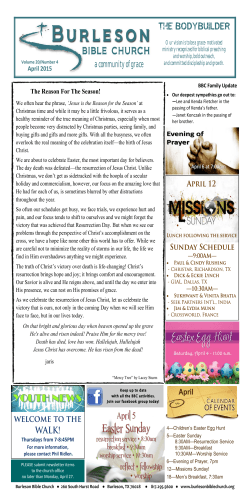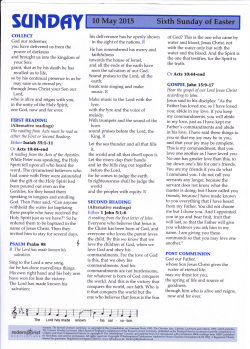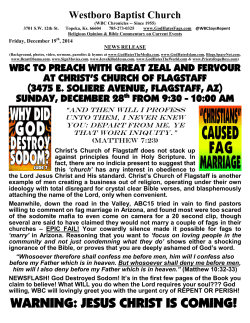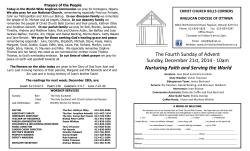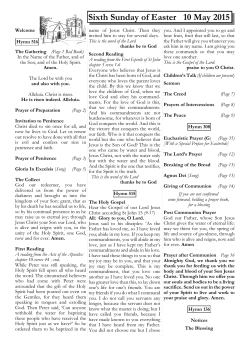
w.en.12.4.2015
Sunday Watani Published by Watani Printing and Publishing Corporation 27, Abdel-Khaleq Tharwat St. Cairo - Egypt 202-23936051 Tel Fax 202-23935946 Website: www.wataninet.com Email: watanipaper@gmail.com 12 April 2015 4 Baramouda (Parmoute) 1731 Editor-in-chief Managing Editor Youssef Sidhom Samia Sidhom Editorial From darkness to light Happy Easter Happy Shamm al-Nessim Youssef Sidhom This year we celebrate the glorious Resurrection of Christ and his triumph over death amid high hopes and confidence in a bright future for Egypt and her Church. I say this as I remember the Christmases and Easters of the past four years, which we used to mark with lumps in our throats and hearts heavy with distress. Egypt was then in the grip of the post-Arab Spring Islamist tide that was taking hold of power in the country. Predictably, Copts and their Church were the first to suffer at the hands of the Islamists. Today we thank the good Lord who extended His protective Hand and delivered Egypt from the dark tunnel she was trapped in. We are grateful for His protection of His Church and children against all the blows that were directed at them; with His grace they emerged with deeper faith and love, and staunch patriotism. Amid the joy of the Resurrection and the strong hope for a new beginning and a blossoming future in Egypt, I am happy to extend my sincerest Easter wishes to His Holiness Pope Tawadros II, head of the Coptic Orthodox Church, and to all the Coptic Orthodox clergy and congregation. I also offer my heartiest wishes to all the heads, bishops, clergy, and congregations of all the Orthodox, Catholic and Evangelical Churches in Egypt. I pray for the Lord to carry on His miraculous work of protecting Egypt and her Church, and blessing her people as they continue their passage from darkness to light. Today Copts all over Egypt celebrate the Feast of the Resurrection of Christ from the dead. The joyful event comes after the melancholy of Holy Week during which prayers feature the fall of Adam and accordingly all humankind, and the need for the Divine Promise of Salvation and Redemption. The week climaxes on Good Friday with the commemoration of the Passion and Crucifixion of Christ. The fullday prayers end at sunset with the burial of Jesus; an icon depicting Christ being placed in the tomb is smothered in sweet smelling spices and rose petals then wrapped up in an altar napkin and placed on the altar till the midnight Mass on the Eve of Resurrection Day. The midnight Mass of the Resurrection proceeds to the Bible readings on the Resurrection, and before the Gospel from St John is read, the congregation sings the praise: “O all heavenly host, sing praises to our Lord and rejoice with us today. The Lord has risen from the dead, fulfilled the prophecies, became the firstfruit of those who slept, and gave us eternal life.” The priest/s enter the sanctuary and the drapes are pulled shut. The lights of the church are put out. Inside the sanctuary the priest unwraps the burial icon and three times chants “Christ arose”; every time the head deacon responds “Truly He arose”. The head deacon then twice chants the verses from Psalm 24: “Lift up your heads o ye gates, even lift them up ye everlasting doors, and the King of glory shall come in”. The priest asks from inside the sanctuary: “Who is the King of Glory?” The reply by the head deacon: “The Lord Christ is Risen! Truly He is Risen! God always leads us in triumph in Christ It is my pleasure to wish all of you the blessings of the Glorious Feast of the Resurrection, in which we celebrate the resurrection and victory of our Lord, God, and Saviour Jesus Christ, as well as our liberation from the bondage to evil and death. During the feast of this year, we remember our beloved, who were martyred in Libya, and we ask for their prayers on our behalf. We also pray for their blessed families so the joy of Christ’s glorious resurrection may always fill their hearts. I wish to reflect with you on a verse, which St Paul the Apostle wrote to the Corinthians, “Now thanks be to God, who always leads us in triumph in Christ, and through us diffuses the fragrance of His knowledge in every place.” (2 Cor. 2:14) The procession of Christ’s victory is the procession of His suffering, by which He was triumphant over Satan. Our Lord Jesus Christ walked the road of the Passion, which began with His arrest on the eve of Friday. It was followed by his trials and sufferings, which He endured until the crucifixion. From the outside, it all appeared as if the following was happening: the soldiers were leading our Lord Christ, Pilate sent Him to Herod, the chief priests and scribes judged Him, Pilate ordered to hand Him over to be crucified, the soldiers scourged Him and mocked Him, and then took Him to Golgotha to be crucified. However, this sorrowful but joyful procession was not under human control; it was truly under divine control, because Christ, the Incarnate God, accepted suffering by His own will. Pilate said to Christ, “‘Are You not speaking to me? Do You not know that I have power to crucify You, and power to release You?’ Jesus answered, ‘You could have no power at all against Me unless it had been given you from above.’” (Jn. 19: 1011-) Our Lord Jesus Christ said about Himself, “No one takes it from Me, but I lay it down of Myself. I have power to lay it down, and I have power to take it again.” (Jn 10:18) The procession of the Passion of Christ is the procession of His victory, because by death He trampled down death, rose from the dead victorious over death, and liberated mankind from Satan’s dominion. Christ is calling us to walk in the procession of His triumph, and indeed He is always leading us in this joyful procession. We saw Christ leading our martyrs in Libya in the procession of triumph. In the video, which showed the procession of the martyrs, it appeared that a group of evil men were leading a group of innocent men to death by the seashore. However, when we closely observe the procession and see it with the eyes of faith, we see the hand of Christ holding His children and leading them to Paradise and to victory over evil. Therefore, when we carefully look at the martyrs’ faces, we see their calmness and peace, with their heads lifted and their faces bare, like joyful children in the bosom of their Heavenly Father. As for the wicked men, we see their faces covered with black, fearful of showing their faces to the world lest their uncovered faces reveal the fear that fills their The Holy Resurrection: Christ is risen! Truly He is risen! Christ arose with power and might and set the world free from Satan’s clutches. Only those who do not desire liberty, continue to remain in Satan’s grasp, For the wages of sin is death, but the gift of God is eternal life in Christ Jesus our Lord (Romans 6:23). Only God incarnate who took human flesh to save humanity could pay the ransom. He took what is ours— death and suffering to give us what is His—forgiveness and eternal life. Divine Justice demanded His execution—the slaughtered Lamb who bore the sins of mankind. His sweet aroma, which He was determined to set upon the hill of Golgotha, was the acceptable sacrifice presented to satisfy Divine Justice. +I have been crucified with Christ; it is no longer I who live, but Christ lives in me; and the life which I now live in the flesh I live by faith in the Son of God, who loved me and gave Himself for me+ (Galatians 2:20). God did not hedge us from temptations, but modelled righteousness endured in hardships as He did with Job. During Holy Week, Christ was humiliated, chained, scourged, crucified, and died. Upon His death, He descended into Hades, released its captives, bound Satan, opened the gates of Paradise, and resurrected on the third day. Thus, freedom was granted to us to live as Christians and imitate our Lord Jesus Christ in His goodness and in His endurance. There are five criteria pertaining to living in real freedom. Each criterion is comprised of these five components as described by the prophet Zephaniah (3:17): The Lord your God in your midst, 23 Gamada al-Akhar 1436 Issue 739 Year 15 strong and mighty; the Lord mighty in battle”. At this point all the lights are lit, the sanctuary drapes are pulled open, and the procession of deacons and priest/s carrying the icon of the Resurrection starts in the sanctuary to the joyous praise “Christ arose, truly He arose. With death He conquered death, and to those in the graves he granted everlasting life. Glory be to the Father, the Son, and the Holy Spirit from this time forth and for evermore.” The procession goes three times around the altar then descends to the church nave for three rounds then back into the sanctuary for a final round. The praise “Holy is God, holy is the Almighty, holy is He who does not die, He who rose from the dead have mercy on us” is chanted in the joyful melody mode, and the liturgy is resumed leading up to communion. The congregation then heads home to feast upon all the goodies they had given up during the eight-week fast which preceded Easter. Easter Monday marks Shamm alNessim, the spring feast that goes back to ancient Egypt. Egyptians love to celebrate the day out of doors, in the gardens or on the Nile banks. They eat the traditional salted fish, onions, eggs, lettuce and chickpeas; and indulge in games, singing, and dancing. When Christianity became the dominant religion in Egypt during the first centuries, Copts found that Shamm al-Nessim came during Lent, a period that lends itself very poorly to celebration. They thus moved the date of the spring feast to Easter Monday; the tradition persists to this day. (2Cor. 2: 14) hearts. Whereas, the criminal is the one, who covers his face for fear of facing society, the courageous, strong, and righteous person leaves his face uncovered, not fearing anything, and always has his face lifted up and looking towards heaven. This scene of our martyrs reminds us of St Steven the first martyr. As the evil men were cut to their heart and they gnashed at him with their teeth, he did not look at them and did not lower his head nor was fearful to cover his face. The Book of Acts says, +“But he full of the Holy Spirit, gazed into heaven and saw the glory of God, and Jesus standing at the right hand of God.”+ (Acts 7:55) Indeed, the procession of the Coptic Martyrs by the Mediterranean seashore is a procession of triumph, led by our Lord Jesus Christ as part of the procession of His triumph. Christ diffused the fragrance of His knowledge everywhere through them. The video of H.G. Bishop Serapion the martyrdom of the Copts in Libya carried a message to the whole world testifying to the power of the Christian faith, as revealed in the martyrdom of those heroes, who refused to deny their faith and held fast to their Christian faith till the last breath. As they were led to martyrdom, they repeated the Name of our Lord Jesus. We ask for their intercession and prayers on our behalf, so God may support us to complete our struggle on earth. My Beloved, Let us rejoice in our Living Christ, Who always leads us in the procession of His triumph, regardless of the surrounding circumstances. We are always peaceful and assured that our life is not in human hands, but in the hands of our Living, strong, and powerful Christ, Who died, resurrected, and lives to rule over the living and the dead. Let us remember the saying of St Paul the Apostle, “For none of us lives to himself, and no one dies to himself. For if we live, we live to the Lord; and if we die, we die to the Lord. Therefore, whether we live or die, we are the Lord’s. For to this end Christ died and rose and lived again, that He might be Lord of both the dead and the living.” (Rom. 14: 79-) Let us pray for the peace of the Holy Church. Let us pray for our beloved father, H.H. Pope Tawadros II. Let us pray that our Living Christ may fill our hearts with the joy of His Glorious Resurrection. His Grace Bishop Serapion is Bishop of the Coptic Orthodox Diocese of Los Angeles (www.lacopts.org) Divine justice captured freedom The Mighty One, will save; He will rejoice over you with gladness, He will quiet you with His love, He will rejoice over you with singing • Fear is non-existent. Trust in the Lord with all your heart, And lean not on your own understanding; In all your ways acknowledge Him and He shall direct your paths (Proverbs 3:56-). Fear cannot impact our inner peace and contentment, no matter the circumstances and adversities, for we are assured that God is in our midst. We live in the joy of the holy resurrection beyond the crucifixion. Thus we have learned from many Christians who imitated Christ and accepted martyrdom with joy and song. • Forgiveness is acquired. Who is a God like You, pardoning iniquity and passing over the transgression of the remnant of His heritage? He does not retain His anger forever, because He delights in mercy. He will again have compassion on us, and will subdue our iniquities. You will cast all our sins into the depths of the sea” (Micah 7:1819-). Though sin can be captivating, yet freedom from sin is readily available in living a life of repentance and embracing the holy sacraments, in which we unite with Christ. Forgiveness requires a higher standard of love that can only be experience through Christ Jesus. • Confidence is cultivated. Let us therefore come boldly to the throne of grace, that we may obtain mercy and find grace to help in time of need (Hebrews 14:16). There is no need for self-confidence when one has security in God. Self-confidence can lead to arrogance, but confidence in God leads to justice, mercy, and goodwill. Confidence in God underscores our purpose in His service. • Hope is lived. For there is hope for a tree if it is cut down that it will sprout again, and that its tender shoots will not cease. Though its root may grow old in the earth and its stump may die in the ground, Yet at the scent of water it will bud and bring forth branches like a plant (Job 14:79-). The righteous Job set an example of piety and love toward God despite Satan’s antagonistic assaults on him and his family—those dearest to him. Whether he had or had not possessions did not define his love and devotion to God. He lived in hope even in his example of what many would have believed to be a dead tree. Nonetheless, to Job, this deadness could be resurrected unto life. Christ is the fountain of life—the true spring of water that refreshes our souls that are dead in sins, and can raise us from this deadness like the lifeless tree. • Life is anticipated. If then you were raised with Christ, seek those things which are above, where Christ is, sitting at the right hand of God (Colossians 3:1). Eternal life inseparable with Christ is what Christians live this day and anticipate for tomorrow and await unto everlasting life. All things are relevant in the scope of faith in Christ— nothing more and nothing less. Thus, in imitating our Lord Jesus Christ, our countenance is joyful and peaceful. We are known to Him, and He is known to us. Therefore we are elated to belong to Him. This grace and knowledge sets us apart, because by imitating Him, His light reflects in us and onto others. “But I say to you,” the Lord says, “love your enemies, do good to those who hate you, pray for those who persecute you.” Why did he command these things? So that he might free you from hatred, sadness, anger and grudges, and H.G. Bishop Youssef might grant you the greatest possession of all, perfect love, which is impossible to possess except by the one who loves all equally in imitation of God. —St. Maximus the Confessor We beseech the Lord our God, Jesus Christ, to bless the countries in which we live, and wherever we are called to witness to His holy name throughout the world, and in our mother country, Egypt, and to protect our blessed father and patriarch, His Holiness Pope Tawadros II, for many years and peaceful times. To God be the glory forever, Amen. أسود أس���ود His Grace Bishop Youssef is Bishop of the Coptic Orthodox Diocese of the Southern United States (www. أصفر �ف��ر �أص أحمر أح��م��ر أزرق أزرق Watani International 2 12 April 2015 Christianity as our birthright Sanaa’ Farouk Egyptians have from time immemorial been a pious people. The ancient Egyptians believed in a superior, benevolent power that was in control of earthly life, and that this earthly life was not the final end for human beings; a better life awaited them in eternity. This faith ran through the very fabric of life in ancient Egypt and, as many believe, made Egyptians more than ready to accept and endorse Christianity when it later came to their land. So much so that thousands upon thousands of them willingly accepted torture and death rather than give up their Christian faith. compare to Psalm (73:2126-): “When my heart was grieved and my spirit embittered, I was senseless and ignorant; I was a brute beast before you. Yet I am always with you; you hold me by my right hand. You guide me with your counsel, and afterward you will take me into glory. Whom have I in heaven but you? And earth has nothing I desire besides you. My flesh and my heart may fail, but God is the strength of my heart and my portion forever.” “Thou art with me” In addition, the prayer of Amun which states: “He who nourishes whoever has no bread and feeds his house servant. Never did I need a nobleman to defend me nor had to adhere to a rich man. Never did I need to entrust my wealth to a stranger for my wealth is in the hands of my god. The lord is my protector; I know his strength for he is the saviour. With his strong hand he is the almighty Amun, yet he is merciful and he answers whoever invokes him.” This prayer also compares to Psalm (23: 14-): “The Lord is my shepherd, I lack nothing [In the King James Version (KJV): The Lord is my shepherd, I shall not want]. He makes me lie down in green pastures, he leads me beside quiet waters, [he maketh me to lie down in green pastures, he leadeth me beside the still waters]. He refreshes my soul. He guides me along the right paths for his name’s sake. [He restoreth my soul. He leadeth me in the paths of righteousness for his name’s sake]. Even though I walk through the darkest valley, I will fear no evil, for you are with me; your rod and your staff, they comfort me [Yea, though I walk through the valley of the shadow of death, I will fear no evil: for thou art with me; thy rod and thy staff they comfort me].” The spirit of these words, Dr Sadek said, reflects the faith that ancient Egyptians had in their god and prove that they were ready to accept the new God who reached out to them with love. Ready for Christianity A lecture entitled “How did the ancient Egyptian religion pave the road for Christianity?” was recently held at the Coptic Orthodox Cultural Centre (COCC) under the patronage of Pope Tawadros II and Anba Ermiya, Bishop-General and Head of COCC. The lecturer, Ashraf Alexandre Sadek, is Professor of Egyptology, Coptology and Biblical Archaeology at the University of Limoges, France. Dr Sadek began by dedicating the lecture to the soul of Anba Yu’annis (1923 – 1987) who was Bishop of Gharbiya and Secretary-General of the Holy Synod, and was among the prominent modern-day figures who contributed to the Church’s renaissance on the spiritual, service, and intellectual levels. Dr Sadek started off by making the point that the ancient Egyptian civilisation was among the earliest to believe in the presence of God. “I had the opportunity to translate dozens of hieroglyphic and hieratic texts which prove that ancient Egyptians were the first to believe in the one God. The experiences, hardships and philosophies of that ancient nation prepared them to know the one true God and embrace Salvation,” Dr Sadek said. The One God The Holy Trinity The ancient Egyptians believed in the presence of a sublime power which they sometimes represented as a group of deities, each handling an aspect of their daily life: the god of love, god of harvest, god of beauty, god of power, and many others. The many characteristics— goodness, giving, justice, love—would be incorporated in one deity and, as obvious in various instances, the old Egyptians believed in the presence of one God. The verse in Acts (17:14): “Yet he has not left himself without testimony” agrees with the fact that old Egyptians believed God was there, arduously sought Him, and came close to finding Him. The many hymns they sang testify to this, among them “I am the eternal being of goodness, the self-created entity, the god of heaven and earth.” Dr Sadek recited excerpts from the hymn of praise to Amun-Ra dating back to 2000BC “All the people and all creatures worship thee and praise thee until the highest heaven. From the four corners of the world and from the depths of the sea. Thou art the absolute one, having no other. Thou art the one having uncountable names (having the several traits attributed to many gods).” Many religious theories which have emerged in ancient Egypt dating back to the earliest dynasties spoke about the greatness and ability of the god who rules the universe. An ancient text that highlights this reads: “I am the past and the present, the self-created entity.” Dr Sadek linked this text to the Bible verse in Exodus and in the Book of Revelation (1: 8): “’I am the Alpha and the Omega,’ says the Lord God, ‘who is, and who was, and who is to come, the Almighty.’” St Mark, the apostle who brought Christianity into Egypt in the first century Ashraf Sadek When Christianity entered Egypt, the Egyptians discovered this loving God was a Trinity. But they had no difficulty in accepting this central mystery of Christian theology because the idea was not new to them. In their ancient religions, many gods existed as trinities or triads such as Amun-Mut-Khonsu, Ptah-Sekhmet-Nefertem, and Osiris-Isis-Horus. The ancient Egyptian definition of the trinity does not really match its Christian counterpart; each god of these Trinities had a specific function in the life of ancient Egyptians. For instance, Osiris was the god of Eternity, Isis the goddess of mercy and motherhood (she is sometimes compared to St Mary, the Mother of God), and Horus is the heir to his father and he avenges his killing by Seth, the manifestation of evil. The ancient Egyptians’ idea of Trinity, despite being an incomplete theological mystery, prepared them to know the Real Holy Trinity and to embrace Christianity. It is also worth noting that the Jews themselves did not understand this mystery despite the fact that it had been cited several times in the books of the Old Testament, Dr Sadek explained. Resurrection to eternal life The ancient Egyptians’ belief in resurrection and in the afterlife and their keenness to be prepared for it by preserving the bodies of the deceased for the resurrection is also in line with many verses of the Bible. In Mark (12: 2627-), Jesus answers the Sadducees who asked Him about the resurrection of the dead: “Now about the dead rising—have you not read in the Book of Moses, in the account of the burning bush, how God said to him, ‘I am the God of Abraham, the God of Isaac, and the God of Jacob’? He is not the God of the dead, but of the living.” Also the Bible text: “But if it is preached that Christ has been raised from the dead, how can some of you say that there is no resurrection of the dead? If there is no resurrection of the dead, then not even Christ has been raised.” (1 Cor. 15: 1213-) At the end of the lecture, Dr Sadek displayed a number of pictures that prove that ancient Egyptians were religious by nature, always seeking the help of the great deity who radiates his light to everyone. Other pictures showed ancient Egyptians praying and practicing religious rituals, temples and statues of old deities, and scenes from the desert which was a major factor in shaping the personality of ancient Egyptians. Biblical correlations During most of the history of ancient Egypt, the main god was Amun, the unseen God; this can also be compared with John 1: 18 “No one has ever seen God.” Dr Sadek went on reading more hymns of ancient Egypt and comparing them to verses from the Bible. “Thou created the grass for the cattle to live, the plants for humans, thou created the fish so that it lives in the water and the birds in the sky. All nations praise thee to the highest heaven, to the ends of the earth and to the depths of the great green sea (ancient name of the Red Sea).” Another ancient text: “I was an ignorant and foolish man, unable to differentiate between good and evil. I have sinned in front of the sublime but he has taught me a lesson and punished me for my sins. Then he approached me affectionately, like a gentle breeze, and was merciful to me after he had shown me his strength.” This text can easily Watani International.... Watani International.... Watani International.... Watani International....Watani International Editor-in-chief Youssef Sidhom Editorial teamw Cairo staff Managing editor Copy editor Layout editor Samia Sidhom Jenny Jobbins Heba Adel Christine Alphonse Dalia Victor Donia Wagdy Lydia Farid Nivert Rizkallah Sherine Nader International staff Executive editor Magdi Khalil (NY) Tel/Fax 443 292 8327 E-mail: magdi.khalil@hotmail.com Contributing editor Mahfouz Doss (LA) Tel (1) 310 8263388, Fax (1) 310 8208480 E-mail: madoss@ worldnet.att.net Senior editors Saad Michael Saad, (Los Angeles) Contributing editor Adel Guindy (France) Fax (33) 147012600 E-mail: adel.guindy@gmail.com Laila Shafik Farid (U.K) Contributing editor Subscriptions and Advertising Subscription rates for one year (52 issues): North America US$ 125 Europe, Africa US$ 110 Australia, Far East US$ 150 Kindly complete the form below, and send it along with your payment in US$ or equivalent, payable to Watani International 1627 New Windsor Ct., Crofton, MD 21114, Tel/Fax 443 292 8327 Or pay by credit card Name on the card: Card #: Expiry Date: Card Type: Master Card Visa American Express Address: Tel: Washington office: 1627 New Windsor CT., Crofton, MD 21114;Los Angeles office: P.O.Box 2442, Rolling Hills Estates, CA 90274 أسود أس���ود أصفر �ر �أص��ف أحمر أح��م��ر أزرق أزرق
© Copyright 2025



